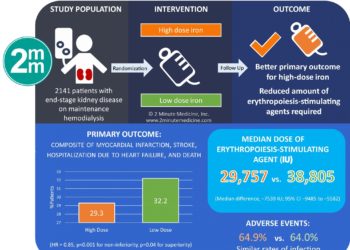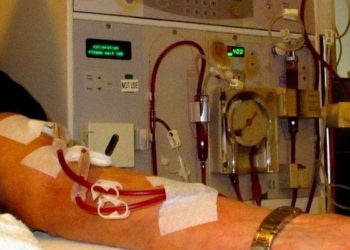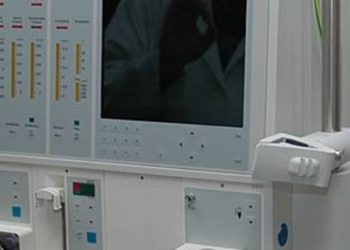Patient Basics: End-Stage Renal Disease
Originally published by Harvard Health.
What Is It?
End-stage renal disease is a condition in which the kidneys no longer function normally. “Renal” describes anything having to do with the kidneys. Nearly everyone is born with two kidneys. They both need to fail for end-stage renal disease to develop.
Kidneys eliminate poisons from the body, and keep a normal balance of fluid and certain minerals in the body. When the kidneys can no longer perform this function, a person becomes very ill and ultimately dies.
In end-stage renal disease, the kidneys function at a fraction of their normal capacity. When this occurs, there are only two options: replace the job the kidneys are supposed to do by using a machine, instead (kidney dialysis) or transplant a new, healthy kidney. A single new kidney can do the work of the two kidneys.
Diabetes is the leading cause of end-stage renal disease. Kidney disease can result from type 1 or type 2 diabetes. With either type, poor control of blood sugar increases the risk of end-stage renal disease.
Other common causes of end-stage renal disease are:
- High blood pressure
- Atherosclerosis
- Autoimmune diseases like systemic lupus erythematosus (lupus)
- Genetic disorders, such as polycystic kidney disease
- Exposure to toxic drugs, including:
- certain antibiotics
- chemotherapy
- contrast dyes
- pain relievers
Symptoms
Symptoms of end-stage renal disease include:
- Weight loss
- Nausea or vomiting
- General malaise
- Fatigue
- Headache
- Hiccups
- Itching
- Decreased urination
- Easy bruising or bleeding
- Lethargy
- Difficulty breathing
- Seizures
Symptoms may remain mild or absent until kidney function drops to less than 20% of normal.
Dialysis is urgent when one or more of the following occurs:
- Inflammation of the covering of the heart
- Fluid overload or congestive heart failure (CHF) that cannot be managed with medications. In CHF, fluid backs up into the lungs, legs and other parts of the body.
- Dangerous elevations of potassium, sodium or acids in the blood. These substances can affect how other organs function.
- Confusion, decreased alertness or seizures
- Bleeding related to kidney failure that cannot be improved through other means
- Severe, unrelenting nausea and vomiting
Dialysis may also be necessary if symptoms affect quality of life or nutritional status. This is especially true if they are accompanied by severely abnormal blood tests.
Diagnosis
Kidney disease is diagnosed through urine and blood tests. These tests measure levels of creatinine and urea nitrogen in the urine and blood.
Additional tests may be necessary to determine why the kidneys have stopped working.
Expected Duration
End-stage renal disease is a lifelong condition unless a kidney transplant is done. Even with a successful transplant, a person must take medicine for the rest of his or her life.
Prevention
You can take steps to reduce your risk of developing end-stage renal disease:
- If you have diabetes, control your blood sugar.
- Closely monitor and aggressively treat high blood pressure. High blood pressure further damages the kidneys in people with kidney disease.
- If you have kidney disease, avoid over the counter arthritis medicines. Non-steroidal anti-inflammatory drugs (NSAIDs) can cause kidney damage.
- A low-protein diet may slow the progression of existing kidney disease.
- Quitting smoking and lowering cholesterol levels may also help.
Treatment
The two treatments for end-stage renal disease are dialysis and kidney transplant.
Dialysis
There are two types of dialysis:
- Hemodialysis. During hemodialysis, blood is removed from a vein. It is run through filters to remove waste products. The blood is then returned to the body. Hemodialysis usually is done at a dialysis center. The treatments are done three times a week, in three- to four-hour sessions.
- Peritoneal dialysis. During peritoneal dialysis, sterile fluid is infused into the abdomen. Waste products gradually accumulate in the fluid, which is drained several hours later. Peritoneal dialysis is done at home. It takes longer than hemodialysis and must be done four to five times a day. It can be automated to occur during sleep.
Kidney transplants
Kidney transplants allow people with severe kidney disease to avoid or discontinue dialysis. However, even a successful kidney transplant is not a cure.
Anyone who receives a kidney transplant must take immunosuppressive drugs for life, unless they received a kidney donated by their identical twin. These are drugs that prevent the body from rejecting the donated organ. In addition, a good genetic match is needed for a successful transplant. Most transplant candidates wait one to three years before they are matched to a kidney from an unrelated donor.
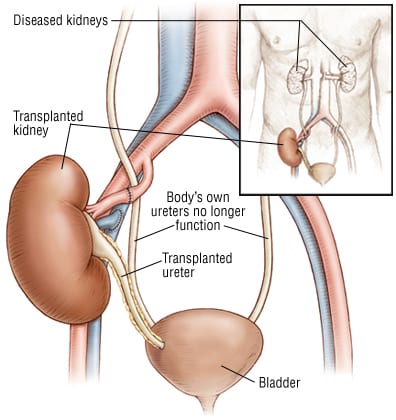 |
When To Call a Professional
You should have regular checkups if you have:
- Diabetes
- High blood pressure
- Other diseases that put you at risk of end-stage renal disease
These checkups should include urine and blood tests to measure your kidney function.
When blood tests indicate kidney disease, your doctor should refer you to a kidney specialist. This specialist is called a nephrologist.
Call your doctor if you notice any decrease in urination or other symptoms of end-stage renal disease. Be particularly vigilant if you have kidney disease or its risk factors.
Prognosis
When kidney failure occurs, treatments offer hope for good recovery. Many people on dialysis or who have received transplants lead near normal lives.
Additional Info
National Institute of Diabetes & Digestive & Kidney Disorders
Office of Communications and Public Liaison
Building 31, Room 9A04
31 Center Drive, MSC 2560
Bethesda, MD 20892-2560
Phone: 301-496-4000
http://www.niddk.nih.gov/
National Kidney Foundation
30 East 33rd St.
New York, NY 10016
Phone: 212-889-2210
Toll-Free: 1-800-622-9010
Fax: 212-689-9261
http://www.kidney.org/

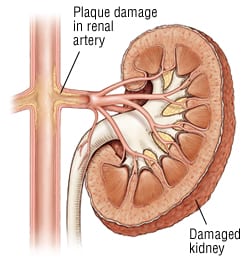
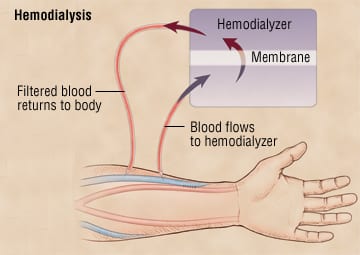
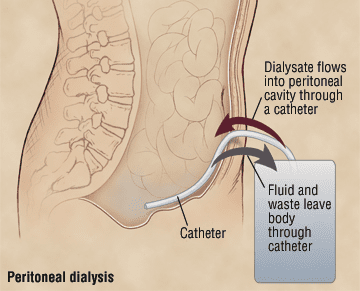
![The ABCD2 score: Risk of stroke after Transient Ischemic Attack (TIA) [Classics Series]](https://www.2minutemedicine.com/wp-content/uploads/2013/05/web-cover-classics-with-logo-medicine-BW-small-jpg-350x250.jpg)
